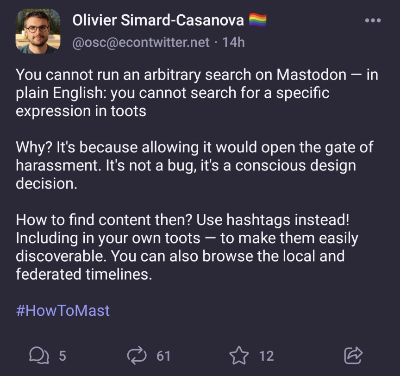David Cordero
Some thoughts about Mastodon and Social Networks
Published on 14 Nov 2022
This post is just a series of thoughts that I have been into lately after some days back to social networks to give it a try to Mastodon.

How it started
For various reasons, that I do not really care about, there has been a lot of controversy about Twitter lately. In the technical community, this situation led to some relevant people replacing Twitter with Mastodon.
Mastodon is an open-source decentralized service for microblogging. It is part of the Fediverse, which is a group of services based on federated servers.
These days I read a lot about this concept of Fediverse and the different services that are currently available. If you want to know more about these topics, I recommend you read the articles of Fediverse and Mastodon in Wikipedia.
The Fediverse sounded quite interesting to me, so I decided to give Mastodon a try.
The Context
I have to say that I am not a very active person on social networks. Even though I still have a Twitter account, just to avoid somebody else getting my username to impersonate me, the truth is that I barely use it.
The only use case for me to use Twitter nowadays is to share my blog posts right after publishing them on my website. However, you will rarely find tweets in my timeline. This is because a couple of days after publishing anything on Twitter, I go back there again just to delete it.
Yes, I know, this could be automatized somehow, but since this situation happens around two or three times per year, I did not really want to waste any time on this.
The Experiment
In the last weeks, I have been using Mastodon as I would use Twitter in the past. I shared some thoughts, shared articles and conferences that I found relevant, I followed some people with the same interests as me, and I interacted with others by liking, replying, or republishing the publications that I found interesting.
To be honest, the experience was quite straightforward and not very surprising. The only thing that I found confusing was the way that searching works.
This is because to avoid harassment, searching in Mastodon is limited to hashtags.

The Result
This was an interesting experiment. I think that it was a good experience to return to social networks for a few days to understand them better and to remember the reasons why I decided to stop using them back in the day.
Even though Mastodon is politically and technologically different from Twitter, the truth is that it is not that different on a regular basis. Because of this, I think that it still suffers the same issues that made me leave Twitter.
• Digital Privacy
As it happens with any other social network, using Mastodon offers a public log with too much personal information. Using Mastodon in a standard way means regularly sharing what you like, what you read, what you think, where are you, where are traveling to, etc… and this is all information that I am not willing to share publicly.
• Ego feeding
As it happens with Twitter, Mastodon is also based on individuals. In both networks you are not following topics but persons. This leads to people with a lot of followers becoming tuitstars (or mastodostars?).
This level of fame is not something that everybody can cope with, and it is very easy to become arrogant or end up sharing way too much information as a result. I think it happened to all of us that we followed a tuitstar developer and we end up knowing every single detail about their life.
• Social slave
One of the main benefits of leaving social networks back in the day was to be able to focus on the present and not on sharing this moment publicly. Nowadays for example, if I go to a restaurant, I like that I can focus on the food and the people that are with me, instead of trying to make the best photo to share in my timeline.
• Creativity
I also noticed that using social networks ruins my creativity. All these moments of silence and boredom are when my brain activates and it starts creating ideas. You can not imagine the amount of bugs that I have fixed while taking a shower or on the train looking though the window on my way to the office.
Filling these moments with social networks means not giving my brain any time slot for creativity.
Conclusion
With this experiment, I learned once again that I am happier without social networks. In practice, I do not really care if they are open source or decentralized, I simply do not like the way that I feel when using them and I do not like the impact that they have on my life.
So, what am I doing next?
Basically, the same thing that I did back in the day with Twitter. I am deleting all my posts in Mastodon, logging out, and continuing with my life.
I already adopted healthier alternatives to be up to date such as Books, RSS feeds, and Podcasts, and I am happy to know that leaving Mastodon means that I will have again more time to focus on those options instead.